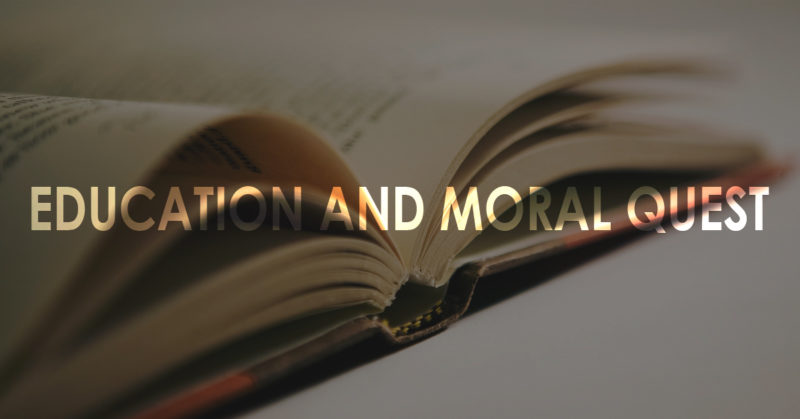
Recalling the Forgotten: Education and Moral Quest is a 2009 book by Professor Avijit Pathak who teaches at the Centre for the Study of Social Systems, Jawaharlal Nehru University. In this book, Professor Pathak discussed in detail the emancipatory ideals of education and the need to ‘recall the forgotten wisdom, renew it, enlighten ourselves, fight the present pathology, and move towards a better future.’
‘Recalling the Forgotten: Education and Moral Quest’
Once I asked my students to write an honest opinion on Plato’s education scheme (which spanned for about fifty years). Plato’s education scheme was a process designed to train and select the right ruler which he called ‘philosopher king’. In a class of 35 students, the responses ranged from ‘it is bad because one has to study the whole life’; it is good as we will get the right leader’. The responses varied in degree and tone but the essence was the same. The sense I got from the students’ response was that education was a training, a program with a time frame, a burden, an obstacle to clear. They are not wrong.
What did we do? Where did we go wrong? What has become of our education system? How do we ‘heal’ ourselves and overcome the present pathology? These are some of the questions that deserve our attention. Teaching as a vocation requires ‘perpetual reflection’ and not a mere cognitive/intellectual exercise. Education is about empowering the minds and not chaining the minds. As teachers and educators, it is our duty to help/facilitate our students how to think but often we end up teaching ‘what to think’. Our present education system needs honest and critical evaluation.
As a young student I took part in a symposium competition on the theme ‘Education is to get a government job’. I approached a teacher in our neighbourhood to help me write my speech who gave the opening line I will never forget. He wrote ‘education is the gateway or channel to life’ and told me to write the speech myself. I did not understand the line but it has stayed with me all this time. I look back and realize how that small incident has shaped me. The teacher could have written a whole speech for me and probably I would have won the competition. I wrote the speech and did not win the competition. But I wrote the speech and it made me think. The teacher helped but made sure I think about the theme myself.
Allow me to relate another high school memory of my class teacher in Class V. I have very bad hand-writing. I still do. My class teacher noticed that. After school, she would ask me to stay back and practice my hand-writing. She made me write in different ways- joining the letters, not joining the letters. It is the job of every teacher to help the students but how she helped made all the difference. She took care not to embarrass her student in-front of the class, and put in extra effort and time to help.
Classroom pedagogy and the environment we create in learning spaces are crucial for young minds to grow and flourish. If education is about empowering the minds, then, the first step to heal ourselves and our present education system should be to empower educators. This calls for a critical re-evaluation of the practices and inherent pathologies of our existing education system. This is important for two reasons. Such a re-evaluation would open up the possibility of rectifying the problems inherent in the existing system. More importantly, such an exercise would give hope about ‘a new possibility and constructing a new world’. We cannot aspire for a greater outcome from education than the hope of a new possibility and a better world.
In a fast moving world with one thing leading to another, reflection and retrospection, the guiding principles of education may have become the most neglected aspect of education. In the words of the American historian and philosopher Will Durant ‘education is a progressive discovery of our own ignorance’, we might as well pause and reflect. Reflection and introspection may not be very pleasant but the possibility of finding new hopes and creating new possibilities should give enough reasons. It is for this reason that we need to bring home the empowering ideals of education ‘recall the forgotten wisdom, renew it, enlighten ourselves, fight the present pathology, and move towards a better future’.
At a time when instrumentality and skillsets determine the success and failure in a person’s life it is easy to forget the ideals and the objectives of education. As important as success is we need to find meanings and values in our successes. This is where the role of teachers and educators comes in, to facilitate and guide students not to lose track of their person in the search for success. In short to be able to think and decide for themselves, to not lose themselves in the race. For in the words of Bill Beattie ‘The aim of education should be to teach us rather how to think, than what to think — rather to improve our minds, so as to enable us to think for ourselves, than to load the memory with thoughts of other men’.
Degree of Thought is a weekly community column initiated by Tetso College in partnership with The Morung Express. Degree of Thought will delve into the social, cultural, political and educational issues around us. The views expressed here do not reflect the opinion of the institution. Tetso College is a NAAC Accredited UGC recognised Commerce and Arts College. The editors are Dr Hewasa Lorin, Dr. Aniruddha Babar, Dr. Pfokrelo Kapesa, Rinsit B Sareo, Meren Lemtur and Kvulo Lorin.
For feedback or comments please email: dot@tetsocollege.org

